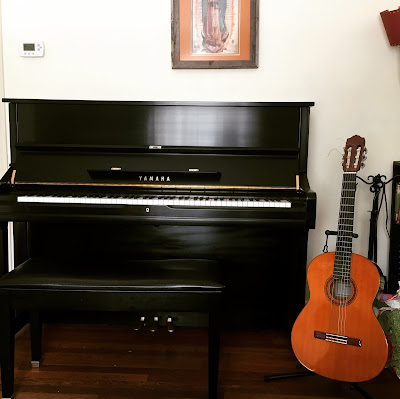I got lessons. I tried, but it didn't work out. It wasn't the right time. I was restless and distracted. We couldn't afford a piano, so we got this little electric keyboard that was difficult to play and without any real inspiration from the instrument or the teacher, I quit.
Then came music school.
I was awarded a scholarship to The Conservatory of Music at Kansas City. For playing drums. When I got to school, my first class was Piano 101, 8am. I stuck with it. I learned my major scales in all 12 keys. But then, when second semester came, I dropped out. Just couldn't stay with it. I was't making any music with the instrument that I enjoyed. It was all theoretical.
As the years went by, I regretted not staying with piano. I picked up guitar, easily and taught myself all the basic chords. But the piano remained a mystery.
I even became intimidated by the piano. Mostly because it just confused me and I couldn't play even the most simple of songs on it. Whenever I'd try to sit down and learn something, I just got frustrated because I couldn't get my mojo on it like I could drums and guitar.
More years went by, finally I bought a keyboard, a decent one. I wrote my first tune on it. I'd get a melody going that I liked, then I'd ask friends what chords went with the melody. I really should have been able to figure that out, but I leaned on friends who were happy to talk music theory at me, leaving me in the dust after one or two concepts.
I tried a few more times to deal with it. At the New School in NYC, and then again with friends who said they could teach me. It always ended the same way: frustration and the wall between me and the piano getting taller and thicker.
Then, I found a guy in my neighborhood. A real teacher who happens to be a great jazz player. Cool! I went to him, paid him, and sat down to learn.
We stared off with major scales, the 5 kinds of 7th chords and that was my mission. I created a practice journal and kept detailed track of my progress. In a few months, I could play "Satin Doll" by Duke Ellington. Progress at last!
Where most musicians would go straight over my head with theoretical talk, my new teacher kept it totally simple. Suddenly, things began to stick. I learned inversions of the chords, a task that took several months, but I did it.
In time, I found that I preferred practicing piano to practicing drums. I enjoyed making music, chords, colors. I got addicted to it.
Then, after the first year of study, I was playing songs like "Ladybird" and "Confirmation". I learned all these Tri-Tone Subs for the 2-5-1 progression. Now it was starting to sound a little like Bill Evans! This made me very happy.
Then, I made a huge leap and bought a Yamaha piano. A beautiful upright U-1. I played a chord and listened to it ring out..... The sonics of the strings seemed to change colors as the chord faded. It fascinated me. I sat there all day, playing chords and listening.
Then something really cool happened. I played a gig on drums with a piano trio, and I felt like I didn't have to play so much. In fact, there were many times when I stopped myself from instinctually jumping in and playing the beat right away, I listened more. The drums became something different.
The next gig it happened again, this time even more. I could let the bass and piano be heard more clearly. I found myself finding ways to not play as much cymbals, so that I could hear the sonics of the bass and piano. Suddenly, even playing standards became infinitely more interesting and the possibilities became open ended.
I'd heard drummers talk about the piano changing their hearing, but I never understood until now.
Another cool thing that happened: I started finishing tunes that I'd started, but couldn't finish. I put melodies on these cool vamps I'd written, then added a bridge or another section. My tunes started to make sense, started to sound like what I wanted to write. This was/is exciting! I learned about chord tones, passing tones, leading tones. Ah moments came left and right.
So, I write this post for drummers who are maybe intimidated of the piano, maybe they don't know where to start. My best advice, find a teacher who lives close to you and who is consistent. Also, they must know what you want out of it. Do you want to be a concert pianist? Probably not. You need a basic understanding of music as a whole, and as far as the piano is concerned, you just need to be able to play enough to get what you want out of it. The right teacher is key. Take your time and find the right teacher, not just a friend who can help you with some theory, not a buddy who wants to trade piano lessons for drum lessons. Get a real teacher. one who has a track record. One who has a method worked out.
 The piano is such a joy now and it's only getting better. I'm really glad I gave it another chance.
The piano is such a joy now and it's only getting better. I'm really glad I gave it another chance.